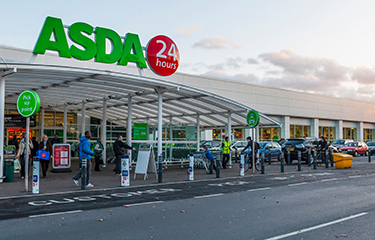U.K. supermarket chain Asda Stores Ltd. has determined that sustainability improvements need to be made across its seafood supply chain, with a new independent report finding that some of its best-selling capture-fisheries products may be putting marine mammals, sharks, seabirds, and sea turtles at risk.
Walmart-owned Asda, the second-largest supermarket chain in the United Kingdom, is the country’s first multiple retailer to assess the impacts of its seafood business on ocean wildlife.
The study, conducted by Sustainable Fisheries Partnership, RSPB/Birdlife International, and Whale and Dolphin Conservation, assessed bycatch in the fisheries that supply Asda’s seafood. In addition to identifying the fisheries that pose the greatest risk to endangered, threatened and protected (ETP) marine species, it also recommends actions that Asda can take to reduce these risks.
Key findings of the study include:
- Longline fisheries for tuna in the Indian and Pacific oceans present serious risks to albatrosses, sharks, and sea turtles.
- Gillnet fisheries for cod and haddock in the Northeast Atlantic Ocean present significant risks to seabirds and marine mammals, including porpoises and seals.
- American lobster pot and trap fisheries are an entanglement risk to whales, such as the endangered North Atlantic right whale, with their buoy lines at the surface.
“Asda is committed to being a leader on sustainable seafood in the retail industry,” Asda Senior Director for Sustainable Supply Chains Chris Brown said. “Asda wanted to study fisheries bycatch, because we know we need to do more to protect marine wildlife. This report now provides us with a clear plan of the improvements we need to achieve from our seafood suppliers. We hope that our actions will motivate others in the seafood sector to look at the impacts of their supply chains on the ocean environment.”
Included in the report’s “priority recommendations” are increased observer coverage on yellowfin tuna longline vessels – in both the Indian Ocean and Western and Central Pacific Ocean – to at least a minimum of 5 percent now, with a goal of achieving 100 percent (human and electronic) coverage within the next three years. Similar actions are put forward for the albacore tuna longline fishery in the Southern Indian Ocean, cod and haddock gillnet fisheries in the Northeast Atlantic Ocean, and the salmon gillnet fishery in the North Pacific Ocean.
To reduce the risk to right whales, it recommends a substantial reduction in the number of traps in the American lobster fishery, as well as gear modifications, and the adoption of closed areas.
As well as identifying that the levels of bycatch monitoring are generally poor – and that there is a need to adopt higher levels of observer coverage – other common themes to emerge from the study were that more needs to be done to address bycatch, there is an urgent need for increased bycatch reporting, and alternative gear options in high-bycatch-risk fisheries need to be examined, according to SFP Chief Programs Officer Blake Lee-Harwood.
“For seafood to be fully sustainable, we need to act at a much larger scale to address bycatch in commercial fisheries,” Lee-Harwood said. “We have seen retailers effectively leverage major fisheries improvement by working in their supply chains. Now, we need retailers like Asda to be leaders and use their reach and influence to reduce the impacts of seafood production on ocean wildlife.”
RSBP/Birdlife International Bycatch Program Manager Rory Crawford said the study showed there is still a lot of work to be done to tackle the capture of seabirds in fisheries.
“Happily, for many fishing gears there are solutions to this problem that can be implemented at minimal cost. Our hope is that this study results in better uptake of solutions and improved monitoring of fisheries, so the more retailers that participate in a similar process, the greater the potential impact,” he said.
WDC Ending Bycatch Program Manager Sarah Dolman praised Asda for being the first supermarket to investigate this aspect of its seafood supply chain and to investigate this further.
“Bycatch problems have been identified in a number of fisheries through this joint project and we will work with Asda to improve fisheries measures so their consumers can be confident that seafood bought does not harm whales, dolphins and porpoises,” Dolman said.
The report calls on all retailers to systematically assess their seafood supply chains for risks to ETP species and for suppliers to deliver changes in the fisheries that pose the greatest threat.
Photo courtesy of Luis Santos/Shutterstock







